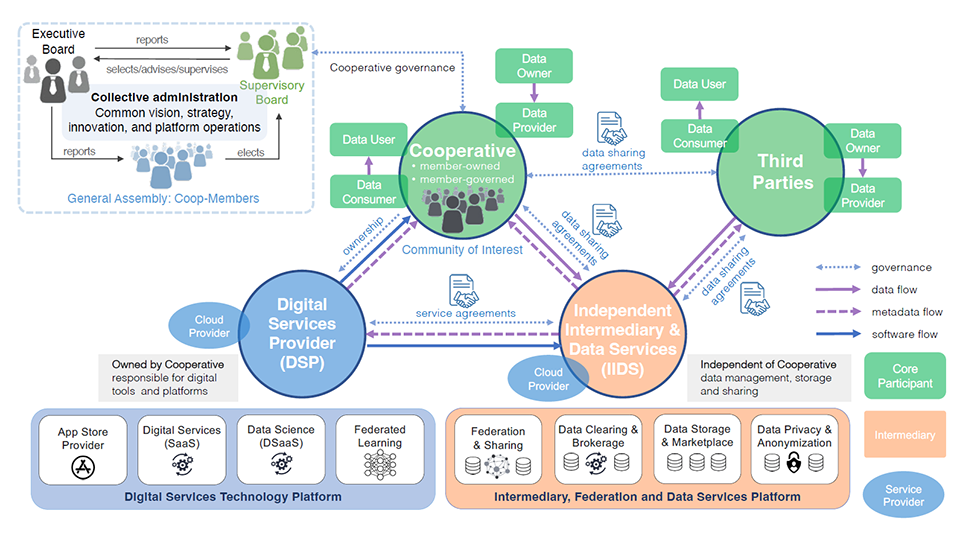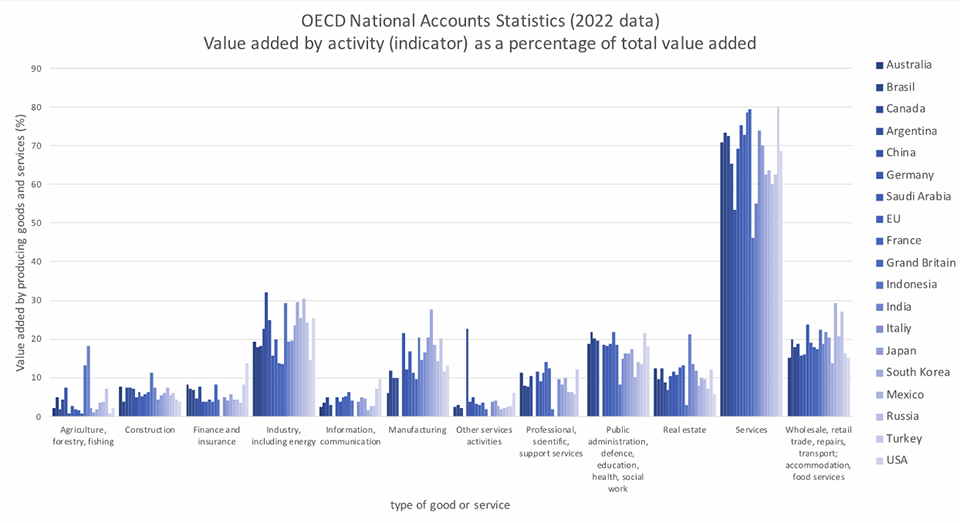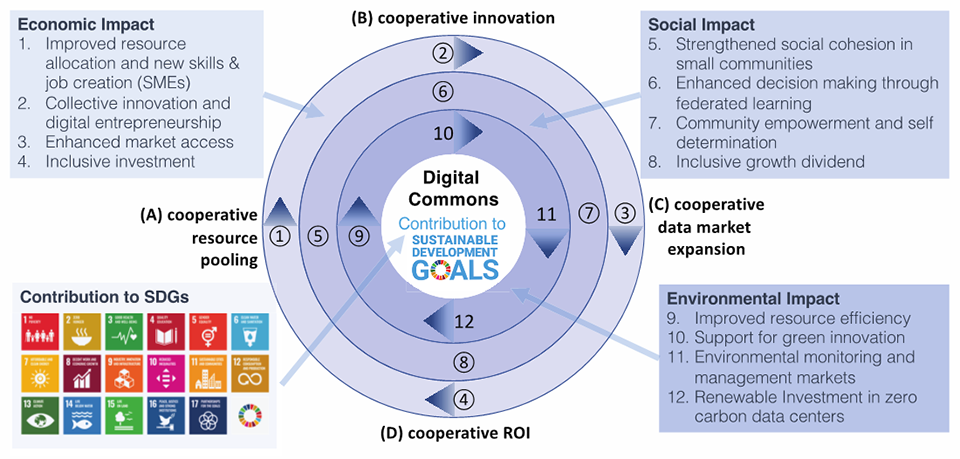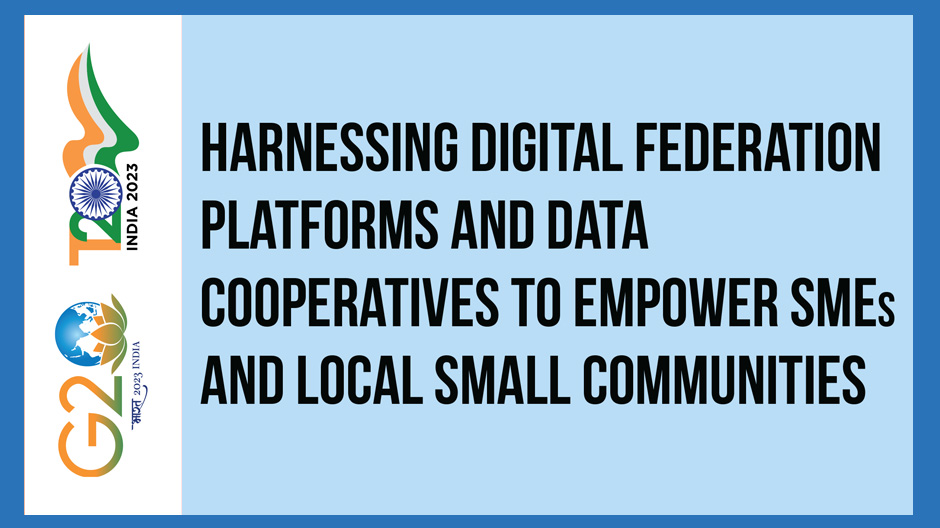TF-2: Our Common Digital Future: Affordable, Accessible and Inclusive Digital Public Infrastructure
Digital resources and capabilities are concentrated due to network effects and economies of scale, limiting equitable digital entrepreneurship and job creation, particularly in local communities through small and medium enterprises (SMEs). In response, this policy brief advocates for the establishment of data cooperatives to ensure sovereign data exchange, promote digital entrepreneurship, protect digital rights, and contribute to community well-being. In the post-pandemic era, community and/or SME-led cooperatives can secure decentralised supply chains, supporting digital commons and data sovereignty. Through such cooperatives, communities can access affordable information and collectively negotiate data-related decisions, supporting self-determination in an AI-driven world. This brief presents diverse case studies demonstrating the transformative potential of data cooperatives across sectors worldwide. It proposes a framework for a digitally federated and sovereign architecture, providing a blueprint for achieving the Sustainable Development Goals. It concludes with six key policy recommendations for the G20 to foster inclusive and sustainable digital ecosystems.
1. The Challenge
The barriers that must be overcome
This policy brief addresses key challenges, such as the concentration of digital resources in a few dominant players, Big Tech resulting in an erosion of digital entrepreneurship and job opportunities, and the negative effects on local communities and small and medium enterprises (SMEs). These issues impede progress towards Sustainable Development Goals (SDGs) 8, 9, and 11, which focus on inclusive economic growth, innovation, and resilient communities. Data and platform cooperatives can effectively address these challenges:[1]
- Market concentration: Large tech companies benefit from network effects, economies of scale, and lock-in effects, leading to an increased concentration of digital resources and hindering competition and innovation, particularly for SMEs and local communities.
- Digital exclusion and data divide: The monopolistic digital environment often leaves local communities and SMEs without affordable and accessible digital resources, leading to digital exclusion and data divide.
- Insufficient data governance: Many local communities and SMEs lack proper data governance structures and open standards, limiting their ability to fully utilise data-driven insights.
- Underdeveloped skills and capacity: The concentration of resources in the digital landscape results in a skills gap in small communities and SMEs, hindering their participation in the digital economy and adaptability to technological advancements.
- Eroding self-determination and data sovereignty: The rising influence of AI and dominance of a few major players undermine self-determination and data sovereignty of local communities and SMEs, restricting their ability to shape their digital future.
This policy brief proposes establishing open digital federation platforms and data cooperatives to address the challenges of market concentration, digital exclusion, inadequate data governance, skills gap, and eroding self-determination.[2],[3] These cooperatives, emphasising democratic governance and equitable benefits, empower small communities and SMEs, aiding in the achievement of SDGs 8, 9, and 11. However, hurdles, such as legal and regulatory constraints, funding and sustainability issues, scalability, technology infrastructure, and governance, must be overcome. Additionally, cooperatives need to address user awareness, interoperability, data privacy, competition, and the need for supportive regulatory frameworks. A thorough exploration of these challenges can inform the development and adoption of these cooperative models.
Definitions of key concepts
Data sovereignty refers to the right of individuals, organisations or governments to have control and ownership over their data, including how it is collected, processed, stored, and shared. This underscores the importance of local legal compliance in data privacy, cross-border transfers, and cloud computing.[4],[5]
An open digital federation platform is an online system that encourages data sharing and collaboration while maintaining individual autonomy and data sovereignty. This structure boosts transparency and innovation, and promotes new applications and services, fostering economic and sustainable growth.
A data cooperative (see Figure 1) is a member-owned organisation that democratically manages and shares data while allowing members to retain control over their data. They provide a platform for individuals and micro-entrepreneurs to negotiate data processing terms and conditions, promoting data sovereignty, equitable data access, and data-driven innovation. These cooperatives aim to build trust and cooperation, producing economic, social, and environmental benefits for members and the community.[6]
A platform cooperative (co-op) is a digital platform owned and governed by its members, often users, workers, or stakeholders. This contrasts with conventional digital platforms, usually owned by private corporations. Platform co-ops prioritise democratic governance, fair profit distribution, and member welfare, operating on cooperative principles. They appear across sectors like ride-sharing, e-commerce, and social networking, and offer more equitable, sustainable alternatives to traditional platforms. Data cooperatives are a sub-category of platform cooperatives.[7]
Digital commons are shared virtual spaces where digital information and assets are collectively managed and made accessible by a community. These include open-source software, creative works, research data, and educational materials. Operating on collaboration, openness, and participatory governance, these challenge traditional intellectual property models, promoting open access, knowledge sharing, and collaborative innovation, thereby advancing democratisation of knowledge and sustainable digital ecosystems.
Digital rights are the human and legal protections applied to individuals and organisations in digital contexts, extending such traditional rights as privacy and freedom of expression to the digital realm. These involve protection of personal information, online information sharing and access, protection of digital creations, and use of digital technology without the fear of surveillance or harassment. Advocacy for these rights counters challenges, such as government surveillance, corporate data collection, and online censorship, striving for a more democratic digital environment.
Figure 1: Potential organisational structure of a data cooperative

Source: Authors’ own
Economic, social, and environmental impact of data cooperatives
Implementing digital federation platforms and data cooperatives can yield significant economic and social benefits for small communities and/or SMEs. In the modern knowledge economy, data is a reusable and non-depletable capital with potential for significant value creation when shared and repurposed. These structures promote trust, informed consent, and data-driven innovation, generating direct, indirect, and induced impact for data providers, users, and the broader economy. However, quantifying these benefits is challenging. Recent studies suggest data access and sharing can create substantial value for holders, users, and the wider economy, contributing up to 4 percent of GDP when including private sector data. Despite potential reductions in producers’ surplus, sectors with low productivity and digital maturity may see the most significant growth potential. Data cooperatives are the key to unlocking this value by leveraging collective strength (see Figure 2).
Figure 2: ‘Value added’ in all G20 economies

Note: This signifies the net value generated from producing goods and services, calculated as output value minus intermediate consumption. It represents the income available for labour and capital contributions in production.
Source: Authors’ own, based on OECD data.[8]
Data cooperatives pool resources (Figure 3, A) to improve resource allocation, create jobs, and foster community development, thereby strengthening social cohesion. They improve resource efficiency, promote sustainable practices, and collect better data because of members’ direct involvement in data governance. They also establish fair compensation systems, rewarding members appropriately for their contributions. This creates a virtuous cycle of collaborative resource pooling, innovation, market expansion, and return on investment, which reinforces positive economic, social, and environmental impact, promoting a sustainable, inclusive future for members and their communities.
Cooperative innovation (Figure 3, B) within data cooperatives harnesses the power of collaboration to drive novel ideas and solutions. Members can make well-informed decisions and address challenges creatively by leveraging shared knowledge and resources. This collaboration fuels technological advancements and sustainable practices, and enables tackling complex global issues while promoting a culture of creativity and sustainability.
Cooperative data market expansion (Figure 3, C) emphasises the role of data cooperatives in facilitating greater market access and empowering members, including individuals and SMEs. Through resource pooling and knowledge sharing, cooperatives help members tap into new opportunities beyond geographical limitations. They also foster growth in environmental monitoring and management markets, driving sustainable development for the benefit of members and the environment.
Cooperative ROI (return on investment, see Figure 3, D) underscores shared value creation and inclusive growth from sustainable investments within data cooperatives, such as those in zero-carbon data centres. It ensures equitable distribution of economic gains and reinvestment in the cooperative, promoting sustainable and inclusive growth. The economic, social, and environmental impact of digital federation platforms and data cooperatives presents a strong case for G20 support, underlining their potential benefits for inclusive and sustainable growth in small communities and SMEs.
Figure 3: Virtuous cycle of economic, social, and environmental impact of data cooperatives

Source: Authors’ own
Pathways to transformation: 10 inspiring case studies driving meaningful change
This section demonstrates the practical application of our recommendations by showcasing transformative use cases and case studies from Asia and Africa, with limited examples from Europe and the US (Table 1). It highlights the barriers and shortcomings that demand policy action proposed.
Table 1: Exemplary transformative case studies
| Case Study 1: Mobile Money in Africa
(Kenya’s M-Pesa platform) |
M-Pesa, a mobile money platform launched in Kenya, revolutionised financial inclusion by providing affordable, accessible, and secure digital financial services to millions of unbanked individuals. This example illustrates the transformative potential of a digital platform that effectively empowers small communities and businesses. However, the challenge is to extend the benefits of such platforms to other sectors, including education, healthcare, and supply chain management, by establishing data cooperatives and adopting open standards. |
| Case Study 2: Digital Agriculture in Asia
(India’s eKutir data co-op) |
eKutir, a social enterprise in India, leverages digital technologies to empower smallholder farmers through data-driven agricultural advice, access to finance, and market linkages. By pooling data and resources from various stakeholders, eKutir demonstrates the potential of a data cooperative to drive sustainable development in rural communities. Yet, scalability and replicability of this model require supportive policies and a robust digital governance framework. |
| Case Study 3:
Collaborative Land Management in Africa (Ghana’s Farmerline data co-op) |
Farmerline, a Ghanaian agriculture technology company, provides smallholder farmers with timely and accurate agricultural information through mobile technology. By pooling data from various sources, Farmerline exemplifies the potential of data cooperatives to drive sustainable development and food security in rural areas. To scale and replicate this model, supportive policies and a strong digital governance framework are essential, along with financial support from international partners. |
| Case Study 4: Decentralised Renewable Energy in Asia (Bangladesh’s SOLshare data co-op) | SOLshare, a peer-to-peer energy trading platform in Bangladesh, enables rural communities to access affordable, clean energy by connecting solar home systems in a decentralised network. The platform exemplifies the transformative potential of data cooperatives for promoting sustainable development. Nevertheless, broader adoption of such models requires development of open standards, APIs, and legal frameworks that support data sharing and collaboration. |
| Case Study 5: Fintech for Financial Inclusion in South America
(Brazil’s Nubank platform) |
Nubank, a Brazilian digital bank, has successfully expanded access to financial services for millions of underserved individuals in the region. By leveraging digital technologies and data-driven solutions, Nubank illustrates the potential of innovative platforms to empower small communities and businesses. Further development of data cooperatives in this sector can facilitate better credit access and risk assessment for SMEs, requiring supportive policies and collaboration between stakeholders. |
| Case Study 6: Telemedicine in Asia
(Indonesia’s Halodoc platform) |
Halodoc, an Indonesian telemedicine platform, connects patients in remote areas with healthcare professionals through digital consultations, improving access to quality healthcare services. This initiative demonstrates the value of digital platforms for addressing critical challenges faced by rural communities. The expansion of such platforms, combined with the establishment of data cooperatives, can empower local communities and healthcare providers to make more informed decisions. However, this requires developing robust data governance structures and open standards. |
| Case Study 7:
Community Networks in Africa (South Africa’s Zenzeleni data co-op) |
Zenzeleni, a community-owned telecommunications network in South Africa, provides affordable internet access to rural communities by leveraging cooperative ownership and management. The initiative highlights the importance of local ownership and collaboration for bridging the digital divide. However, regulatory barriers and limited resources impede the expansion of such initiatives, calling for policy interventions and financial support from the G20 countries. |
| Case Study 8: Construction Industry in Bavaria, Germany (Germany’s
GemeinWerk data co-op) |
GemeinWerk proposed the first construction data cooperative in Munich, Germany. This Bavarian Construction Data Cooperative, which was launched by the Bavarian Construction Industry Association and the GemeinWerk Ventures, and which will be operated by cooperative members, aims to provide small and medium enterprises in the construction industry with access to shared services and construction data through a digital collaborative platform and data cooperative. This platform improves collaboration and organisation within the construction value chain. The project primarily targets governance innovations to intensify industry collaboration, enable trust-based data sharing among stakeholders, and create a pre-competitive space of trust that drives productivity and innovation among SMEs through ecosystem collaboration. |
| Case Study 9: Smart City Initiatives in Europe (Barcelona, Spain and Salus Coop, Spain) | Barcelona’s smart city initiatives leverage digital technologies and data-driven solutions to improve urban services and enhance the quality of life for its residents. By utilising data from various sources, such as sensors and citizen feedback, the city has implemented projects related to transportation, waste management, and energy efficiency. This case study demonstrates the potential of data cooperatives and digital federation platforms to facilitate collaboration among stakeholders in urban environments, i.e., Salus Coop. However, the expansion of such initiatives requires development of open standards and robust data governance structures, and the active involvement of citizens in decision-making processes, as the case of Barcelona has shown, reverting the technocratic approach to a smart city paradigm. This model has been largely inspired by the biggest industrial cooperative model worldwide, Mondragon Cooperative Corporation. |
| Case Study 10:
Ride-hailing platform initiative (Driver’s Seat data co-op, the US) |
Driver’s Seat Cooperative is a driver-owned cooperative that operates in a number of cities in the US. It enables gig economy workers in the ride-hailing sector to collect, pool, and analyse the data collected on a smartphone while undertaking work for ride-hailing platforms, such as Uber and Lyft. The pooled data allows insights to be fed back to members so that they can optimise their income. The cooperative also sells data and insights to city agencies to enable better policy decisions, with profits from sales redistributed among members. |
Barriers and shortcomings of data cooperatives and digital federation platforms
- Regulatory barriers: Existing regulations in many countries may not adequately support or may even hinder the establishment and operation of data cooperatives and digital federation platforms, limiting their potential impact.
- Limited resources: Small communities and SMEs often face resource constraints that restrict their ability to develop and implement digital governance structures, open standards, and cooperative models.
- Digital and data divide: Unequal access to digital infrastructure, skills, and resources exacerbates existing inequalities, making it more challenging for marginalised communities to participate in and benefit from digital transformation efforts.
- Data privacy and security: Ensuring data privacy and security is critical for the success of digital federation platforms and data cooperatives, requiring the development of robust governance frameworks and technical solutions.
These case studies underscore the transformative power of data cooperatives and digital federation platforms in tackling issues faced by local communities and SMEs worldwide. However, addressing the identified obstacles calls for targeted policy interventions. Examples from South America, Europe, and the US demonstrate these models’ potential across diverse sectors. Realising their full benefits necessitates overcoming hurdles through policy action, capacity-building, and establishment of supportive regulatory frameworks.
2. The G20’s Role
As a pivotal entity in international economic cooperation, the G20 is uniquely equipped to tackle policy challenges and create opportunities for local communities and SMEs in the digital sphere. The G20’s role in supporting data and platform cooperatives can be summarised as follows:
- Policy harmonisation: Encourage member countries to align policies that enhance digital inclusion, support data cooperatives, and foster an equitable digital economy. This includes incentives for SMEs’ cooperative participation and adoption of open standards and APIs.
- Financial support: Facilitate funding access for developing digital federation platforms and data cooperatives, especially in resource-limited regions, through grants, low-interest loans, or other financial instruments.
- Capacity-building: Support capacity and skills development for small communities and SMEs so that they can effectively participate in the digital economy. This involves collaborating with various stakeholders to deliver relevant training programmes and leveraging established cooperative groups’ knowledge.
- Knowledge sharing: Promote knowledge exchange and best practice sharing among member countries regarding implementation of digital federation platforms and data cooperatives.
- International cooperation: Foster international partnerships to support the development of digital federation platforms and data cooperatives, including collaboration with multilateral organisations and regional development banks.
- Monitoring and evaluation: Implement mechanisms to monitor and evaluate the impact of digital federation platforms and data cooperatives on small communities and SMEs, ensuring that these initiatives contribute to achieving SDGs 8, 9, and 11.
By engaging in these efforts, the G20 can foster a conducive environment for the growth of digital federation platforms and data cooperatives, contributing to a more inclusive digital ecosystem and advancing the global digital economy.
3. Recommendations to the G20
To ensure equitable development of digital entrepreneurship and promote community well-being, this policy brief presents six recommendations to the G20 (Figure 4). These recommendations are supported by strong arguments and evidence from the case studies discussed earlier.
Figure. 4: Proposed chronological order of recommendation implementation

Source: Authors’ own
- Encourage the establishment of digital federation platforms and data cooperatives
The G20 countries should advocate for digital federation platforms and data cooperatives, empowering small communities and SMEs with resources, information, and decision-making capabilities. The G20 should foster knowledge sharing and provide technical aid for these platforms. It should spur such initiatives as ‘Digital Innovation Hubs’ to cultivate local, collaborative digital solutions and nurture a culture of digital innovation and entrepreneurship.
- Develop and harmonise supportive policies and legal frameworks
The G20 countries should harmonise policies and legal structures to advance digital inclusion, open standards, and cooperative data governance. They should motivate member countries to eliminate regulatory obstacles, impacting data cooperatives and digital federation platforms. To this end, the G20 can establish a ‘Digital Policy Innovation Lab’, a collaborative space for stakeholders to co-create, test, and refine policy solutions that foster digital entrepreneurship and create a fair and inclusive digital ecosystem.
- Facilitate access to funding and resources
The G20 should introduce funding mechanisms, such as grants or low-interest loans, to aid the creation and implementation of digital federation platforms and data cooperatives, especially in resource-limited areas. They should seek partnerships with multilateral entities, regional banks, and the private sector to gather resources and foster capacity-building. A ‘Digital Entrepreneurship Challenge’ can be launched globally to incentivise SMEs and communities to devise innovative digital solutions, providing winners with financial backing, mentorship, and resources, thereby promoting innovation and collaboration.
- Strengthen capacity-building and skills development
The G20 should facilitate capacity-building and skills development for local communities and SMEs so that they can better participate in the digital economy. This can be achieved through partnering with international organisations, educational institutions, NGOs, and the private sector to design and implement relevant training initiatives. Furthermore, the G20 can encourage innovative learning by endorsing the creation of ‘Digital Skill-Share Networks’. These peer-to-peer platforms will enable SMEs, communities, and experts to exchange knowledge and best practices in digital technologies and data governance, fostering a collaborative and dynamic learning environment.
- Foster international cooperation and knowledge sharing
The G20 should advocate for international collaboration and knowledge exchange among members to disseminate the best practices concerning digital federation platforms and data cooperatives. This involves partnering with multilateral organisations, regional development banks, and other stakeholders for insights and sharing of experience. An annual ‘Global Digital Commons Summit’ can be instituted by the G20, gathering representatives from member countries, SMEs, communities, and the private sector. This summit will spotlight innovative projects, foster best practice exchanges, and encourage new partnerships, thus bolstering the global digital ecosystem.
- Establish monitoring and evaluation mechanisms
The G20 should devise methods to track and assess the influence of digital federation platforms and data cooperatives on local communities and SMEs. This data can be used to pinpoint improvement areas and ensure that these initiatives contribute to SDGs 8, 9, and 11. The G20 can introduce a ‘Digital Impact Dashboard’, a publicly accessible tool, illustrating the progress and effect of these platforms on small communities and SMEs. This dashboard will enhance transparency and accountability, and facilitate discovery of success stories and areas for growth, thereby promoting continuous learning and adaptation within the digital ecosystem.
By adopting these policy recommendations, the G20 can cultivate a conducive environment for the expansion of digital federation platforms and data cooperatives. This will nurture a more equitable and inclusive digital ecosystem, which will boost the sustainable development of local communities and SMEs.
Attribution: Michael Bühler et al., “Harnessing Digital Federation Platforms and Data Cooperatives to Empower SMEs and Local Small Communities,” T20 Policy Brief, June 2023.
Endnotes
[1] Igor Calzada, “Platform and Data Co-Operatives Amidst European Pandemic Citizenship,” Sustainability 12, no. 20 (2020): 8309.
[2] Michael Bühler et al., “Data Cooperatives as Catalysts for Collaboration, Data Sharing, and the (Trans)Formation of the Digital Commons,” Preprints.org (2023): 2023040130.
[3] Michael Bühler et al., “Data Cooperatives as a Catalyst for Collaboration, Data Sharing and the Digital Transformation of the Construction Sector,” Buildings 13, no. 2 (2023): 442.
[4] Igor Calzada, “Data Co-Operatives through Data Sovereignty,” Smart Cities 4, no. 3 (2021): 1158-1172.
[5] Patrik Patrik, Matthias Braun, Max Tretter, and Peter Dabrock, “Data Sovereignty: A Review,” Big Data & Society 8, no. 1 (2021): 2053951720982012.
[6] Thomas Hardjono and Alex Pentland, “Empowering Artists, Songwriters & Musicians in a Data Cooperative through Blockchains and Smart Contracts,” arXiv:1911.10433 (2019).
[7] Trebor Scholz, Platform Cooperativism. Challenging the corporate sharing economy (New York, NY: Rosa Luxemburg Foundation, 2016).
[8] Organisation for Economic Cooperation and Development, “Value added by activity” (indicator), 2023.





